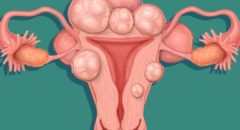
For black women, uterine fibroids pose a particular menace. They occur more often than in their white counterparts, develop sooner and grow larger. Estimates show that fibroids will bring on numerous complications in half of all black women by age 50, compared to 30% of white women. They are rare in women under the age of 20, most common in women in their 30s and 40s, and tend to shrink after the menopause when estrogen levels drop.
Uterine fibroids are growths that commonly develop in the uterus, many times without causing any symptoms that would make her aware that they are present. But for some, fibroids can cause discomfort and heavy vaginal bleeding, which can result in iron-deficiency anemia. Further, some fibroids attached to the uterus by a stem can get twisted, causing pain and fever.
Also known as leiomyomas or myomas, each fibroid apparently arises from a single cell that has escaped the usual controls over growth. Ranging in size from a grape to a small grapefruit, fibroids grow inside the uterus or uterine wall, or outside but attached to the uterus. Many women with fibroids have no symptoms and need no treatment.
Questionable Pressure and Pain?
Uterine fibroids can bring on a number of ailments. If you notice any of these symptoms, be sure to bring them to the attention of your ob-gyn:
• Heavy periods—bleeding that lasts longer and is more frequent than what you’re used to seeing
• Bleeding between periods
• Pain in your back or abdomen
• Difficulty eliminating, either during urination or bowel movements
• Pain during sex—Fibroids that press on the cervix or hang through the cervix into the vagina can make penetrative sex painful and cause bleeding during sex
Regardless of size, about 99% of fibroids are benign. Only very rarely is a fibroid cancerous.
Fertility and Pregnancy Problems
Fibroids can develop during a pregnancy without causing problems, although occasionally, some fibroids, particularly if they are large, can interfere with pregnancy or lead to miscarriage or infertility. Most fibroids shrink at menopause, but some grow so large that they press on other internal organs and must be surgically removed.
Some fibroids get diagnosed during an evaluation for infertility or recurrent pregnancy loss. Usually, the diagnosis will be confirmed with an ultrasound to assess the fibroids’ number, size and location.
Treatment Options
How or even if fibroids should be treated depends on your age, the severity of your symptoms or whether you hope to get pregnant in the future. Because medications that shrink fibroids interfere with fertility, surgery that preserves fertility is the usual treatment for younger women.
4 Strategies for treating fibroids include:
• 1. Medication: Anti-inflammatory drugs and contraceptives containing estrogen and progestin can be used to control abnormal bleeding, but studies show mixed results. An agent called a gonadotropin-releasing hormone agonist can shrink fibroids, but the effect is temporary and fibroids tend to grow back.
• 2. Myomectomy: This involves surgically removing the fibroids and leaving the uterus intact. This procedure is an option for women who still want to have children, but in 20-40% of cases,...
... the fibroids grow back. And in a few women, scarring from the surgery might cause infertility. Depending on the size of the fibroids and where they are located, surgery may be done through the vagina, the navel or an abdominal incision.
• 3. Uterine artery embolization: In this procedure, blood flow to the fibroids is cut off, stopping their growth and causing them to shrink. Because it’s not certain how this treatment affects future pregnancies, it may not be the right choice for a woman still considering having children.
• 4. Hysterectomy: This involves surgically removing the uterus along with the fibroids. Hysterectomy is an option if a woman has severe pain or abnormal bleeding or if fibroids are unusually large, but must be carefully weighed as an option because it ends a woman’s ability to bear children.
Because every case of fibroids is different and because your needs change at different times in your life, consulting with your ob-gyn will help you make the best choice for fibroid treatment.








